Top 8 Legal Artificial Intelligence Software Tools
Navigating the Future of Law with AI
Legal artificial intelligence software is transforming the legal profession, offering solutions to time-consuming tasks and complex challenges. This listicle provides a concise overview of eight leading legal AI tools to help legal professionals, healthcare providers, and compliance officers navigate this evolving field. Discover how software like Whisperit and Ross Intelligence can streamline your work, from contract analysis to legal research, improving efficiency and accuracy. This list highlights key features and benefits of each platform, empowering you to choose the best legal artificial intelligence software for your needs.
1. Whisperit
Whisperit stands out as a leading contender in the realm of legal artificial intelligence software, offering a powerful AI-powered dictation and text editing platform specifically designed to revolutionize document creation and management for legal professionals, healthcare providers, and compliance officers. In a field where time is money and accuracy is paramount, Whisperit promises to significantly reduce paperwork burdens and streamline workflows, enabling professionals to focus on delivering exceptional client service. Trusted by over 170 legal professionals, its impressive feature set and robust security measures make it a compelling choice for those seeking to leverage the power of AI in their daily operations.
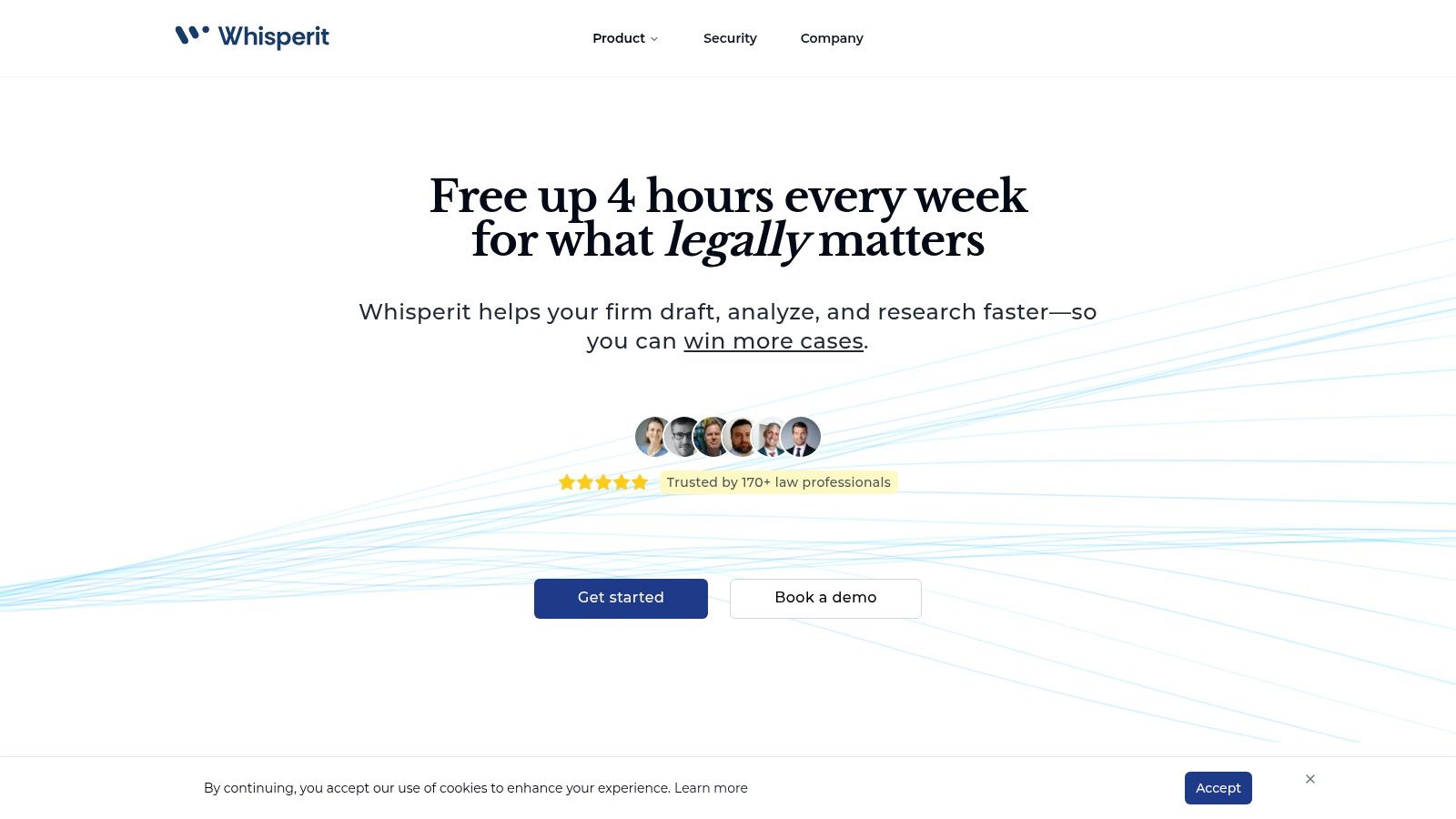
One of Whisperit's core strengths lies in its ability to dramatically accelerate document creation and case analysis. By leveraging cutting-edge AI models, including natural dictation, speaker recognition, and automated transcription, users can draft and transcribe documents up to three times faster than traditional manual methods. Imagine dictating complex legal briefs during a commute or quickly transcribing client interviews with remarkable accuracy—Whisperit makes this a reality. This time-saving efficiency translates directly into increased productivity and cost reduction, with the potential to save firms up to CHF 750,000 annually, depending on usage. This makes Whisperit a valuable asset for legal teams of all sizes, from solo practitioners to large firms.
Beyond its speed and efficiency, Whisperit prioritizes the security and privacy of client data. All data is hosted on private, Switzerland-based servers, renowned for their stringent data protection laws. The platform employs full encryption and adheres to both GDPR and SOC 2 standards, offering unparalleled peace of mind in an increasingly data-sensitive world. This commitment to security is particularly crucial for legal professionals handling confidential client information and sensitive legal documents.
Whisperit offers a comprehensive suite of AI-powered features designed to streamline various legal workflows. Voice dictation allows for hands-free document creation, while speaker recognition ensures accurate attribution during multi-party conversations. Automated transcription eliminates the tedious task of manual transcription, freeing up valuable time for more strategic tasks. Further enhancing its legal artificial intelligence software capabilities, Whisperit provides features for case extraction, helping legal professionals quickly identify relevant information within large volumes of text, and legal research tools to expedite the research process. These features combine to create a powerful platform that empowers legal professionals to work smarter, not harder.
Collaboration is also a key component of Whisperit. The platform offers real-time collaboration capabilities, enabling legal teams to work together seamlessly on documents, share insights, and review materials in a centralized environment. This fosters greater efficiency and consistency across the team, further enhancing productivity and minimizing the risk of errors.
While Whisperit offers a compelling value proposition, there are some considerations to keep in mind. Currently, the platform appears primarily tailored for the legal and related professional sectors, potentially limiting its immediate relevance for professionals outside these fields. Additionally, pricing details are not readily available on the website, requiring a demo or direct inquiry to obtain specific plans and costs.
Implementing Whisperit within a legal practice is designed to be straightforward. Users can easily import existing documents, customize templates to fit specific needs, and quickly familiarize themselves with the intuitive interface. Although specific technical requirements are not detailed on the website, the platform is likely accessible through a web browser, minimizing the need for extensive IT infrastructure or complex setup procedures.
Compared to traditional dictation software or manual transcription services, Whisperit’s integration of AI-powered features, combined with its robust security and collaboration tools, positions it as a highly competitive and innovative solution. While other legal artificial intelligence software solutions may offer similar functionalities, Whisperit's focus on security, its proven ROI, and glowing testimonials from legal professionals give it a distinct edge in the market. For legal professionals, healthcare providers, and compliance officers seeking to leverage the power of AI to enhance productivity and streamline workflows while ensuring the highest level of security, Whisperit deserves serious consideration. You can explore their platform and request a demo at https://whisperit.ai.
2. Ross Intelligence
Ross Intelligence was a pioneering AI-powered legal research platform designed to streamline the often tedious process of legal research. Leveraging the power of natural language processing (NLP), specifically IBM Watson technology, Ross allowed legal professionals to ask complex legal questions in plain English, much like interacting with a colleague or expert. Instead of sifting through countless databases and documents using complex keyword searches, lawyers could simply ask Ross a question such as, "What is the statute of limitations on personal injury claims in California?" and receive a concise, relevant answer supported by case law, statutes, and legal precedents. This ability to interact with legal research tools conversationally represented a significant leap forward in legal tech, offering the potential to significantly reduce research time and improve overall efficiency. Unfortunately, Ross Intelligence is no longer in operation. While it showcased the power of AI in legal research, the company faced legal challenges that led to its closure. You can learn more about Ross Intelligence and the landscape of legal tech companies in this informative article.
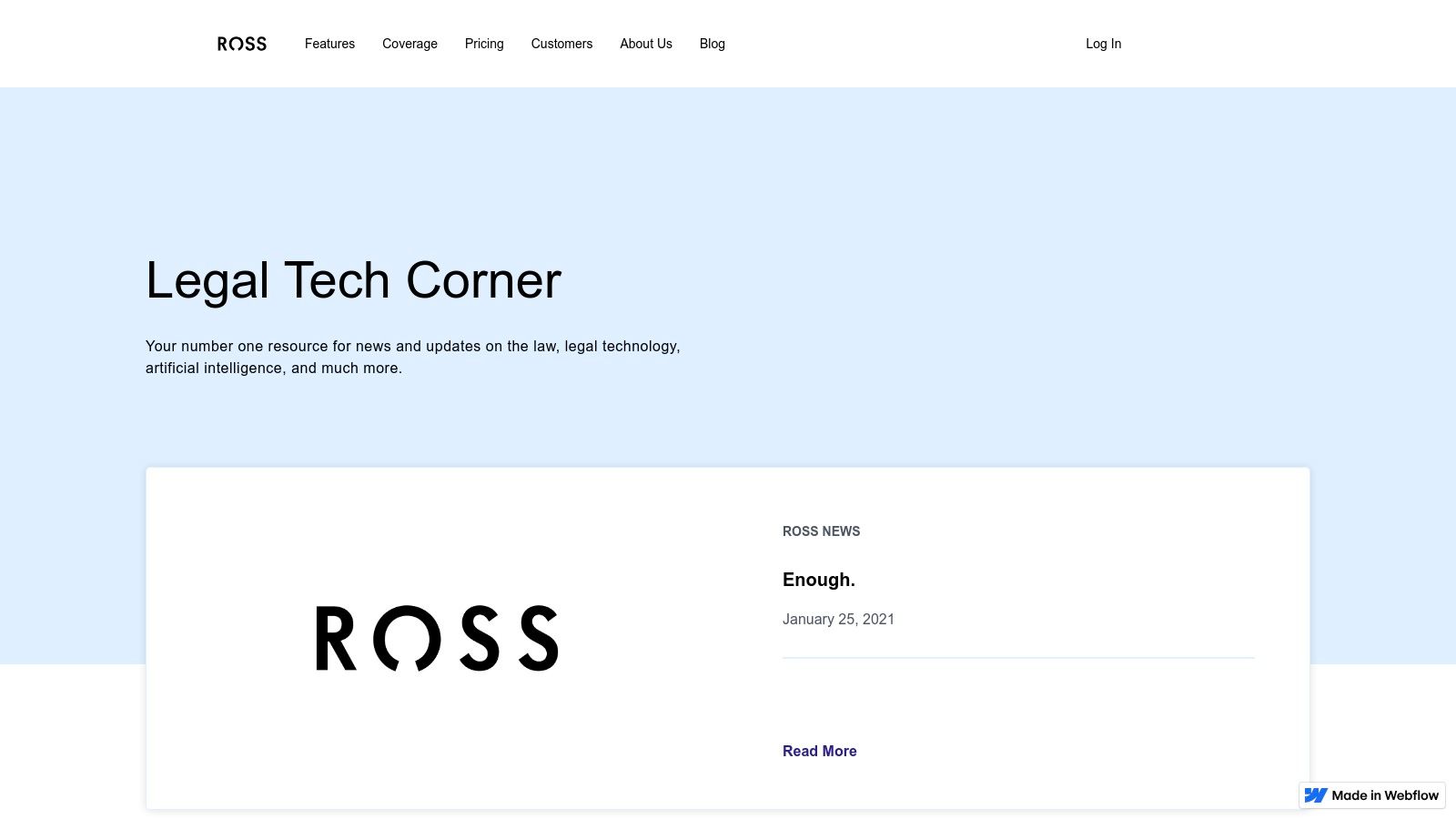
Ross Intelligence's core strength resided in its ability to understand context and nuance within legal language. Unlike traditional keyword-based searches, Ross could interpret the intent behind a user's query, leading to more accurate and comprehensive search results. This contextual understanding also enabled Ross to identify relevant case law that might have been missed using traditional research methods. Imagine researching a complex issue involving multiple jurisdictions and overlapping regulations. Ross could quickly analyze the relevant legal frameworks and present a synthesized overview, saving hours of manual research. For legal professionals working under tight deadlines, this capability was invaluable.
Among its key features, Ross Intelligence offered natural language query processing, AI-powered case law analysis and citation extraction, real-time legal updates and monitoring, contextual search results with relevance ranking, and integration with major legal databases. These features combined to create a powerful research tool that could significantly enhance a lawyer's workflow. The platform aimed to not only provide answers but also to offer insights and analysis, helping lawyers build stronger cases and make more informed decisions.
While Ross Intelligence offered considerable advantages, it also faced certain limitations. The subscription costs could be prohibitive for smaller firms or solo practitioners, and the platform's coverage was limited to specific practice areas. While Ross aimed to provide comprehensive analysis, it remained crucial for lawyers to verify the AI-generated results and ensure their accuracy. Furthermore, like many legal databases, the depth of coverage may have varied across different jurisdictions.
Implementing Ross Intelligence was designed to be straightforward. Its intuitive natural language interface reduced the learning curve, allowing lawyers to quickly adopt the platform without extensive training. The integration with existing legal databases also simplified the transition process, as users could seamlessly access their familiar resources within the Ross platform.
Though Ross Intelligence itself is no longer available, it paved the way for subsequent legal artificial intelligence software. It highlighted the potential of NLP and AI in legal research, demonstrating how these technologies can transform the way legal professionals approach their work. The legacy of Ross Intelligence continues to influence the development of modern legal research tools, pushing the boundaries of what's possible in the pursuit of more efficient and effective legal research. The need for tools that can sift through vast amounts of legal data, understand complex legal concepts, and provide insightful analysis remains strong. The advancements pioneered by Ross Intelligence served as a crucial stepping stone in the ongoing evolution of legal AI software.
3. Lex Machina
Lex Machina stands out as a powerful legal artificial intelligence software solution designed to provide data-driven insights for litigation strategy. Unlike general legal research platforms, Lex Machina focuses on analytics, leveraging the power of AI to analyze millions of court cases, offering legal professionals a significant advantage in understanding case trends, judge behavior, and opposing counsel tactics. This makes it a valuable tool for legal professionals seeking to optimize their litigation strategies and achieve favorable outcomes. This platform is particularly relevant for legal professionals specializing in intellectual property (IP), commercial, and employment law. By providing detailed analytics and predictive capabilities within these specific practice areas, Lex Machina empowers legal teams to make more informed decisions, ultimately saving time and resources.

One of the key strengths of Lex Machina lies in its comprehensive litigation analytics and case outcome predictions. By analyzing historical data from past cases, the platform can provide insights into the potential outcomes of pending litigation. This allows legal professionals to assess the strengths and weaknesses of their cases, identify potential risks and opportunities, and develop more effective litigation strategies. For instance, in an IP litigation case, Lex Machina can analyze the history of similar patent infringement cases handled by a specific judge, predicting potential rulings on key motions and even estimating the likely range of damages. Similarly, in commercial litigation, the platform can analyze the past behavior of opposing counsel, identifying their typical strategies and tendencies.
Lex Machina goes beyond basic case information by providing judge and attorney performance analytics. This feature offers valuable insights into the behavior and tendencies of individual judges and attorneys, including their typical rulings, case durations, and settlement rates. Understanding these patterns allows legal professionals to tailor their arguments and strategies to the specific judge or attorney involved in a case. For example, knowing a particular judge's historical propensity to grant summary judgment motions in similar cases can significantly influence the resources a legal team dedicates to that motion.
Further enhancing its analytical capabilities, Lex Machina offers motion practice insights and timing analysis. The platform tracks the success rates of different types of motions filed in similar cases, helping legal professionals determine the optimal timing for filing motions and anticipate the likely outcomes. This feature can be particularly useful for managing client expectations and developing realistic timelines for litigation.
The platform's damages analysis and settlement trend tracking capabilities are invaluable for negotiating settlements and managing client expectations. By analyzing historical data on damages awarded in similar cases, Lex Machina can provide realistic estimates of potential damages and settlement values. This information empowers legal professionals to make informed decisions about settlement negotiations and avoid costly and time-consuming trials.
Lex Machina provides users with custom report generation and data visualization tools. These features allow legal professionals to create tailored reports and visualizations that summarize key findings and insights. This makes it easier to communicate complex data to clients and colleagues and make data-driven decisions.
While Lex Machina offers numerous benefits, it's essential to consider its limitations. The platform's pricing model can be prohibitive for smaller firms or individual practitioners. Additionally, while its federal court coverage is extensive, state court coverage is more limited. The complex analytics features may also present a steep learning curve for some users. Finally, while expanding, its primary focus remains on IP, commercial, and employment law, making it less suitable for legal professionals specializing in other practice areas.
Despite these limitations, Lex Machina remains a powerful legal artificial intelligence software solution that offers significant advantages for legal professionals. Its comprehensive analytics, predictive capabilities, and data visualization tools can significantly enhance litigation strategy and improve case outcomes. For legal teams handling complex IP, commercial, or employment litigation, the insights provided by Lex Machina can be invaluable. You can learn more about Lex Machina and its features by visiting their website: https://lexmachina.com. Before fully committing, consider requesting a demo to assess whether its capabilities align with your specific needs and budget. This will allow you to explore the platform's interface and understand the scope of its data coverage for your relevant practice area.
4. Kira Systems
Kira Systems is a leading legal artificial intelligence software solution designed to streamline contract analysis and review. Leveraging the power of machine learning, Kira Systems identifies, extracts, and analyzes critical information from contracts and other legal documents, significantly reducing the time and effort required for manual review. This makes it an invaluable tool for legal professionals dealing with high volumes of complex documents, particularly in areas such as due diligence, mergers and acquisitions (M&A) transactions, lease abstractions, and regulatory compliance. By automating these traditionally labor-intensive tasks, Kira Systems empowers legal teams to focus on higher-value work, improve accuracy, and mitigate risks.
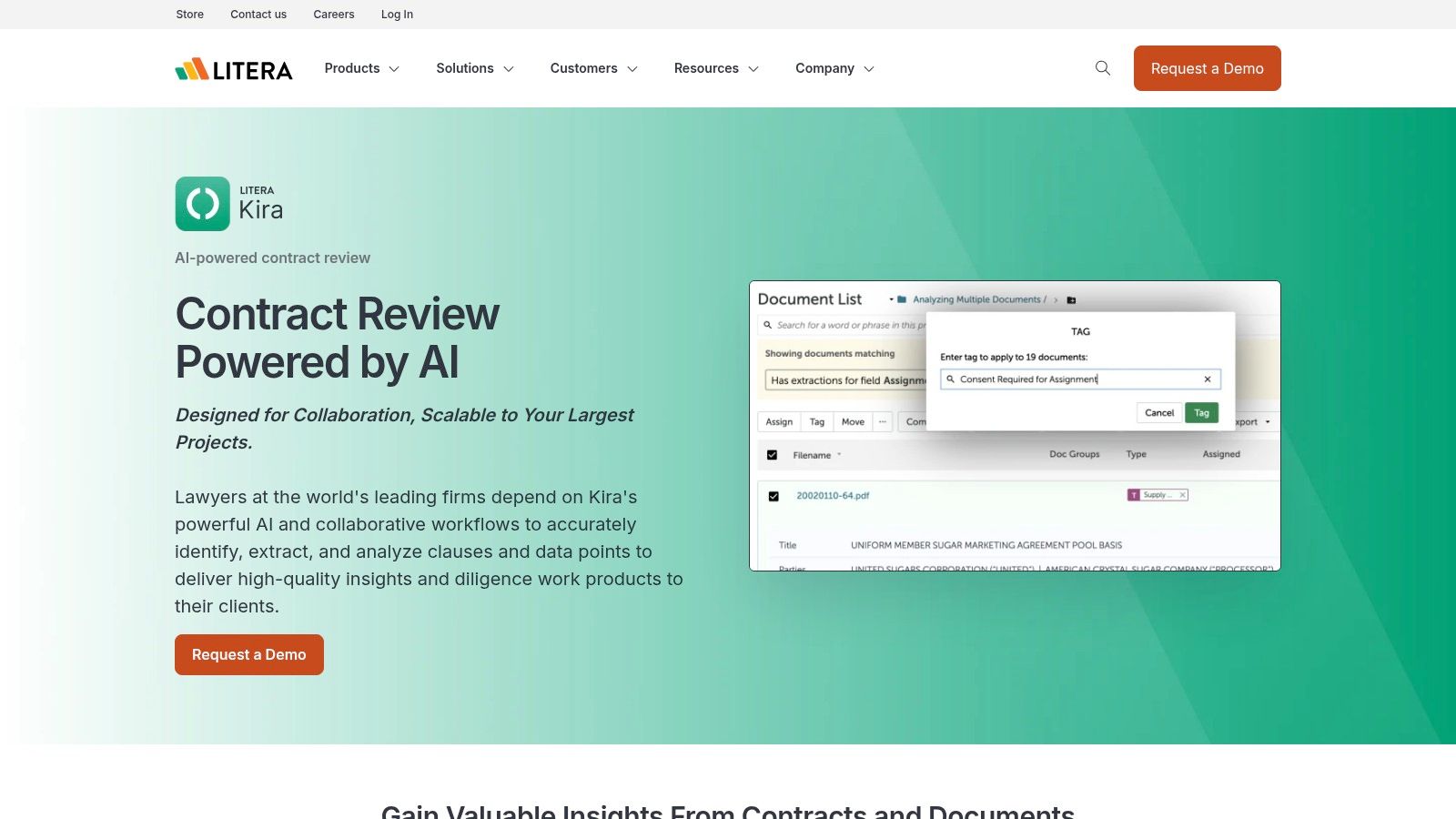
One of Kira Systems’ key strengths lies in its sophisticated AI-powered clause identification and extraction capabilities. The platform boasts a built-in legal provision library with over 1,000 pre-defined clause types, allowing it to quickly and accurately pinpoint and extract crucial provisions within contracts. This eliminates the need for manual identification and reduces the risk of human error, particularly when dealing with lengthy and complex legal documents. The machine learning algorithms within Kira Systems continually learn and improve with use, enhancing the accuracy and efficiency of the extraction process over time. For instance, during M&A due diligence, Kira Systems can quickly identify and analyze key clauses related to change of control, assignment, and termination rights across hundreds of contracts, saving legal teams countless hours of manual review. Similarly, in lease abstraction, Kira Systems can efficiently extract critical data points like lease terms, rent escalations, and option periods, enabling quicker and more informed decision-making.
Beyond M&A and lease abstraction, Kira Systems finds practical applications in a variety of legal domains. In regulatory compliance, for example, the software can be used to identify and analyze clauses related to data privacy, anti-bribery, and other regulatory requirements. This helps organizations ensure compliance with relevant laws and regulations, mitigating the risk of penalties and reputational damage. For healthcare providers, Kira Systems can assist in analyzing contracts with payers and vendors, ensuring compliance with healthcare regulations and optimizing reimbursement processes. Security and Compliance Officers can leverage the software to streamline the review of vendor contracts and security agreements, identifying potential risks and ensuring alignment with organizational security policies.
While Kira Systems offers numerous benefits, it's essential to be aware of potential drawbacks. Implementing and training the software can be costly, especially for larger organizations with complex needs. Setting up the system for complex projects can also require significant time and effort. Furthermore, while the pre-built provision library is extensive, customization options for highly specialized clauses may be limited. The platform's performance can also vary depending on the quality and formatting of the documents being analyzed. Learn more about Kira Systems and how it can improve legal workflow automation.
Unfortunately, specific pricing and technical requirements for Kira Systems are not publicly available and require contacting their sales team. This lack of transparency can be a barrier for some potential users.
Compared to other legal artificial intelligence software solutions, Kira Systems stands out for its highly accurate clause extraction and identification capabilities, extensive pre-built provision library, and strong integration capabilities with existing document management systems. However, alternative solutions might be more suitable for organizations with limited budgets or highly specialized needs.
For those considering implementing Kira Systems, it’s crucial to invest sufficient time in upfront planning and training. Clearly define the scope of your projects, identify the specific clauses and information you need to extract, and ensure your team is adequately trained to use the platform effectively. Proper preparation and training will maximize the benefits of Kira Systems and ensure a smooth implementation process. By automating tedious tasks and providing valuable insights, Kira Systems becomes an invaluable tool in navigating the complexities of modern legal practice. It truly earns its place on this list of essential legal artificial intelligence software.
5. eBrevia
eBrevia stands out as a robust player in the field of legal artificial intelligence software, offering a streamlined contract analytics platform. This AI-powered tool empowers legal professionals to dissect contracts and other legal documents with remarkable speed and precision. Leveraging natural language processing (NLP) and machine learning, eBrevia efficiently extracts critical information such as key terms, clauses, and data points, significantly reducing the manual effort typically required for tasks like due diligence, contract management, and compliance reviews. This efficiency boost allows legal teams to focus on higher-level analysis and strategic decision-making, rather than getting bogged down in tedious document review. For organizations dealing with high volumes of legal documents, eBrevia's automation capabilities can prove invaluable, saving both time and resources. Its inclusion in this list is well-deserved due to its practical applications and potential to transform legal workflows.

One of eBrevia's key strengths lies in its pre-built templates for common contract types. These templates offer a readily available framework for analyzing standard agreements, minimizing the need for extensive customization. Users can further refine the analysis by training the platform to identify specific provisions tailored to their organization’s needs. This custom provision training allows eBrevia to adapt to the nuances of individual businesses and legal specialties, enhancing its accuracy and relevance. Furthermore, the platform's bulk document upload and processing capabilities expedite large-scale reviews, making it an ideal solution for due diligence processes and complex litigation. The extracted data can then be easily exported to common formats like Excel, facilitating further analysis and reporting. For a more detailed look at how AI is impacting legal document processing, you might find this article helpful: Learn more about eBrevia.
eBrevia shines with its user-friendly interface, designed to be accessible even to those without extensive technical expertise. Minimal training is required to navigate the platform and begin extracting valuable insights from legal documents. The platform's impressive processing speed, particularly for high volumes of documents, significantly accelerates review times. Flexible pricing options, including pay-per-use models, cater to varying budgetary constraints and usage patterns. Moreover, eBrevia boasts strong accuracy rates for standard contract provisions, ensuring reliable and consistent results.
While eBrevia offers significant advantages, it also has some limitations. Customizing the platform for highly specialized documents can be challenging, and complex legal interpretations often require manual review by legal professionals. The platform's performance can also be affected by poor document quality, such as scanned images with low resolution or inconsistent formatting. Additionally, compared to some competitors, eBrevia's provision library may be smaller, potentially requiring more manual configuration for less common contract types.
For legal professionals seeking a user-friendly and efficient solution for contract analytics, eBrevia presents a compelling option. Its AI-powered capabilities streamline the review process, freeing up valuable time and resources. Healthcare providers can also leverage eBrevia to manage complex contracts and agreements, ensuring compliance and minimizing risks. Security and compliance officers will find the platform's data extraction capabilities beneficial for identifying potential vulnerabilities and ensuring adherence to regulatory requirements. However, potential users should be mindful of the platform's limitations regarding highly specialized documents and complex legal interpretations. Evaluating specific needs and considering the platform's strengths and weaknesses will help determine whether eBrevia is the right fit for a particular organization. Unfortunately, specific pricing and technical requirements for eBrevia are not readily available publicly and require contacting the sales team directly. This lack of transparent pricing information can be a drawback for potential users seeking to compare options and make informed decisions. However, the availability of flexible pricing options, including pay-per-use models, suggests that eBrevia can cater to a variety of budgetary needs.
6. Luminance
Luminance stands out as a leading legal artificial intelligence software solution designed to streamline document review and analysis. It's particularly valuable for complex legal processes like due diligence, contract negotiation, and compliance monitoring. What sets Luminance apart is its sophisticated application of both supervised and unsupervised machine learning, allowing the platform to comprehend legal documents and pinpoint anomalies, risks, and key provisions with minimal initial training data. This makes it a powerful tool for legal professionals seeking to enhance efficiency and accuracy in their work. Luminance empowers legal teams to move beyond keyword searches and leverage the power of AI to gain deeper insights into their documents, ultimately enabling more informed decision-making.
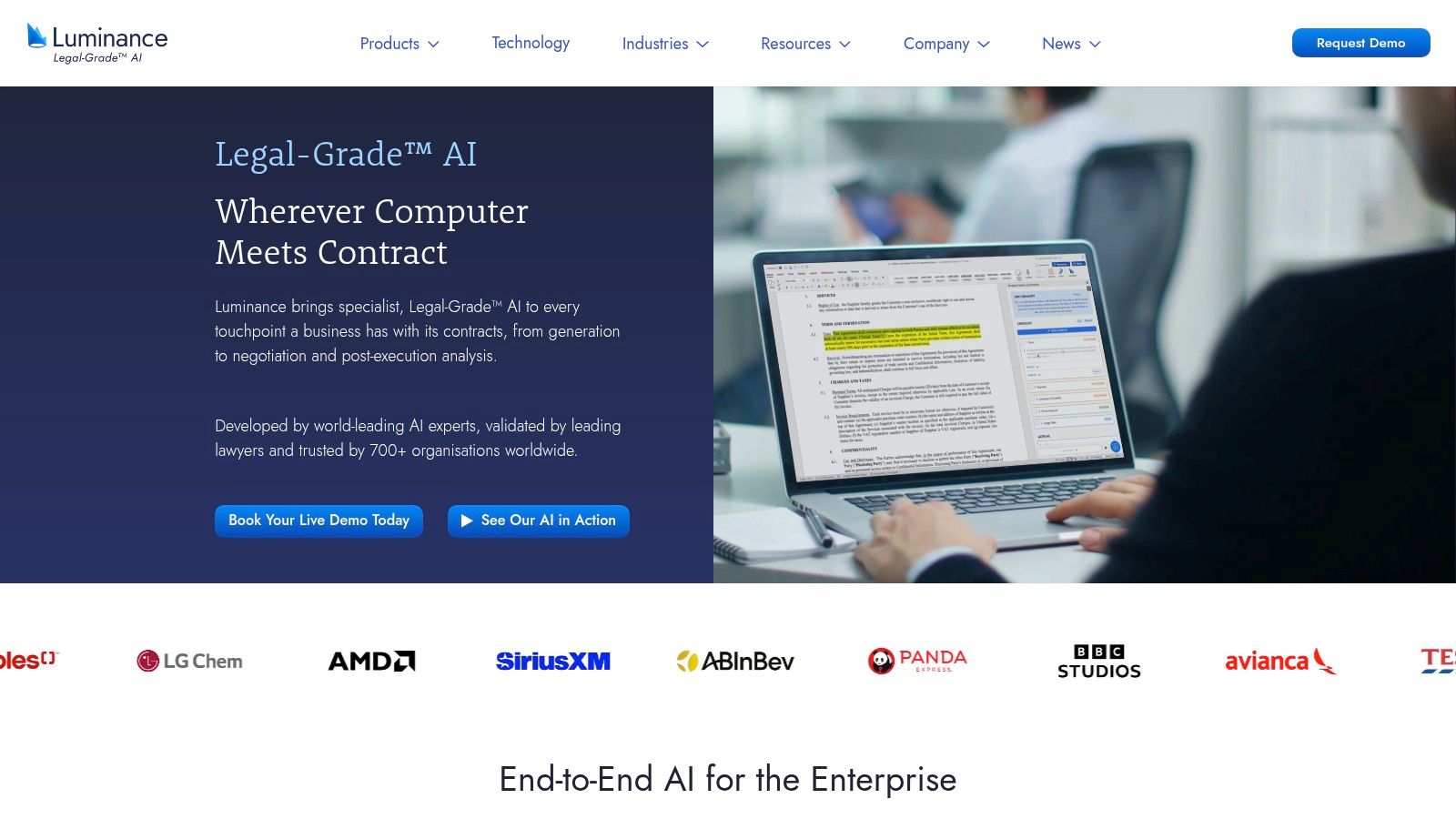
One of Luminance's key strengths is its unsupervised machine learning capability, which excels at identifying anomalies within large document sets. During due diligence, for instance, Luminance can quickly surface unusual clauses, deviations from standard language, or missing provisions that might otherwise go unnoticed. This is crucial for minimizing risk and ensuring thoroughness in transactions. In contract negotiation, the platform provides real-time redlining assistance, suggesting alternative wording and highlighting potential pitfalls. This allows legal teams to negotiate more efficiently and effectively, reducing the time and cost associated with lengthy contract reviews. For compliance officers, Luminance's AI-driven insights can help monitor regulatory adherence by identifying potential violations and flagging areas of concern. This proactive approach to compliance can significantly reduce the risk of penalties and legal challenges.
Luminance's impressive multi-language support also deserves special mention. In an increasingly globalized legal landscape, the ability to analyze documents in various languages is essential. Luminance's sophisticated language processing capabilities allow it to understand and interpret documents in multiple languages, breaking down communication barriers and facilitating cross-border transactions. This feature is particularly valuable for international law firms and corporations dealing with multilingual contracts and legal documents. Furthermore, its clustering and categorization features automate the often tedious process of organizing large volumes of documents, enabling legal professionals to quickly identify related documents and streamline their workflow.
While Luminance offers numerous advantages for legal professionals, it's important to consider its limitations. The platform's premium pricing can be a significant barrier for smaller firms or those with limited budgets. While specific pricing information isn't publicly available, it's generally understood that Luminance's pricing model is based on factors like data volume and usage. Potential users should contact Luminance directly for a tailored quote. Another potential drawback is the complexity of the underlying AI algorithms, which can sometimes be difficult to interpret. While the platform generally provides clear explanations of its findings, understanding the nuances of the AI's decision-making process can require a deeper dive into the technology. Furthermore, integration options with other legal software platforms may be limited, which could create workflow challenges for some firms. Finally, Luminance's performance is dependent on the quality of the input documents. Poorly scanned or formatted documents can hinder the AI's ability to accurately analyze the content.
Implementing Luminance effectively requires careful planning and consideration. While the platform requires minimal initial training, users will benefit from a thorough understanding of its features and capabilities. Luminance provides comprehensive training and support resources to help users get up to speed quickly. When preparing documents for analysis, ensure they are of high quality and properly formatted to optimize the AI's performance. Clearly defining the objectives of the analysis, whether it's identifying risks in a due diligence review or streamlining contract negotiations, will also contribute to successful implementation.
Compared to other legal artificial intelligence software tools, Luminance differentiates itself through its sophisticated unsupervised learning capabilities, multi-language support, and focus on complex legal processes. While tools like Kira Systems and ContractPodAi offer similar functionalities in contract analysis, Luminance's broader application in areas like due diligence and compliance monitoring gives it a distinct edge.
In conclusion, Luminance is a powerful legal artificial intelligence software solution that deserves its place on this list due to its advanced AI-powered capabilities, minimal training requirements, and focus on critical legal processes. While its pricing and complexity may pose challenges for some users, its potential to transform legal workflows and enhance decision-making makes it a valuable investment for many legal professionals, healthcare providers, and compliance officers. For more information, visit their website at https://luminance.com.
7. Westlaw Edge
Westlaw Edge is a leading legal artificial intelligence software solution offered by Thomson Reuters. It stands out as a powerful AI-enhanced legal research platform that blends comprehensive legal content with cutting-edge artificial intelligence tools. This combination empowers legal professionals, healthcare providers dealing with legal complexities, and security and compliance officers navigating regulatory landscapes to conduct faster, more thorough, and insightful legal research. Its aim is to streamline the research process, allowing professionals to focus more on strategic analysis and decision-making. Westlaw Edge earns its spot on this list due to its sophisticated AI-powered search functionalities, predictive analytics capabilities, and its integration into a broader ecosystem of legal practice tools.
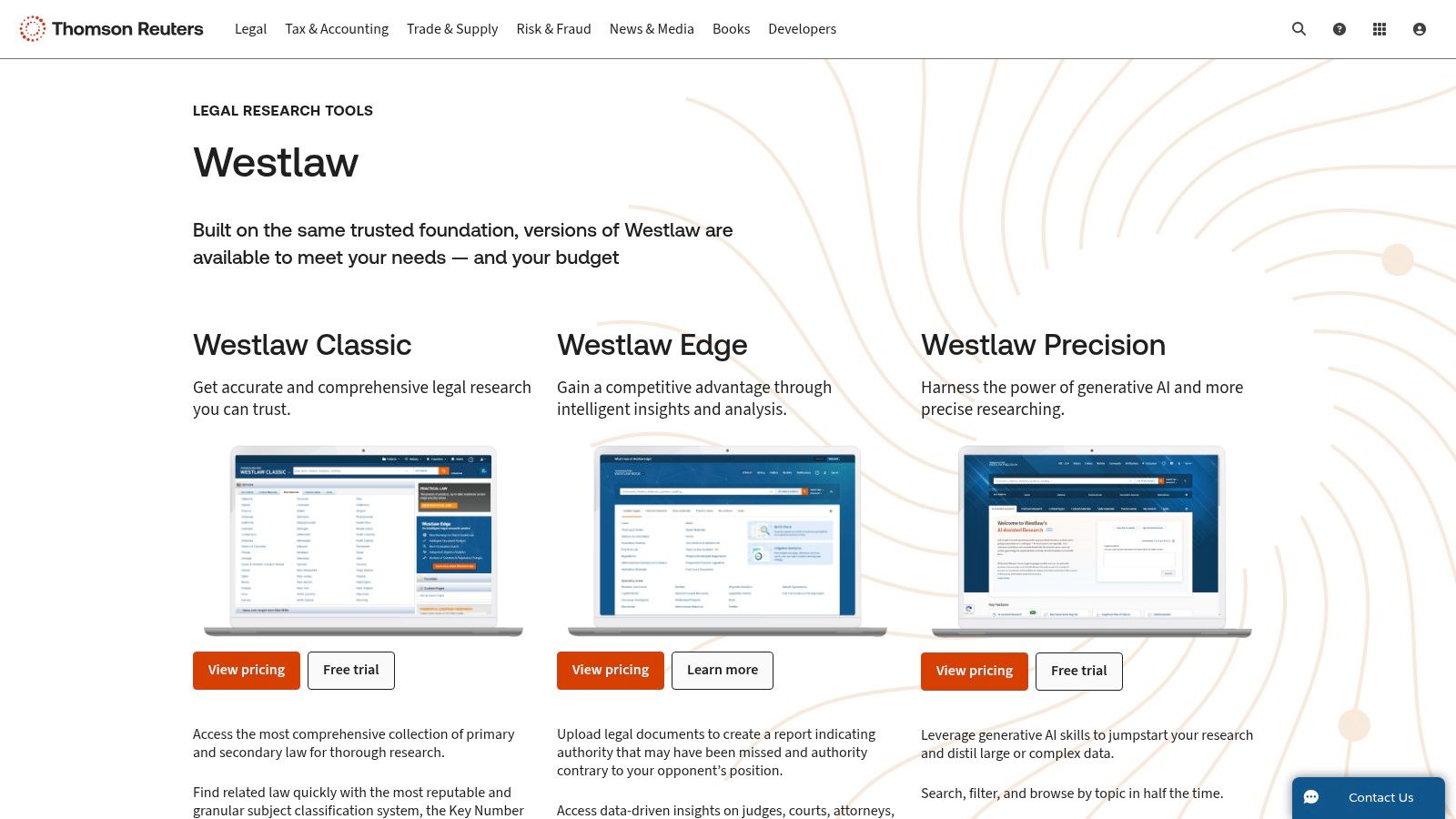
One of the core strengths of Westlaw Edge lies in its AI-powered search functionality. Utilizing natural language processing (NLP), users can pose queries in plain English, as opposed to constructing complex Boolean searches. This feature significantly reduces research time and improves retrieval accuracy, ensuring relevant case law, statutes, and secondary sources are quickly surfaced. For instance, a healthcare provider researching the legality of telehealth practices in a specific state can simply type "telehealth regulations in [state name]" to retrieve pertinent information. Similarly, security and compliance officers can quickly find relevant legal precedents on data breach notification laws by phrasing natural language queries.
Predictive analytics is another key feature that sets Westlaw Edge apart. This functionality uses AI to forecast potential case outcomes and analyze judicial behavior, providing legal professionals with valuable strategic insights. For example, a lawyer preparing for litigation can use Westlaw Edge to assess the likely outcome of a case based on similar historical cases and the judge assigned to the case. This foresight allows legal teams to develop more effective litigation strategies, estimate potential settlements, and manage client expectations more realistically. Litigation Analytics within Westlaw Edge further strengthens this strategic advantage by providing data-driven insights into litigation trends, opposing counsel strategies, and expert witness performance.
Westlaw Edge also offers practical tools for daily legal tasks, like Quick Check. This feature utilizes AI to analyze and validate citations, ensuring accuracy and compliance with legal citation standards. This automated check saves considerable time and minimizes the risk of errors in legal documents. Moreover, the platform integrates seamlessly with other Thomson Reuters legal practice tools, enabling a more streamlined workflow from research to document drafting. For example, findings from Westlaw Edge can be directly integrated into drafting templates, reducing manual data entry and ensuring consistency.
While Westlaw Edge provides significant advantages, it's essential to be aware of the platform's limitations. The cost of subscription can be substantial, especially for smaller practices or individual users. The platform's complex interface, while feature-rich, can be overwhelming for new users, requiring dedicated training to maximize its potential. Furthermore, some advanced AI features might require additional premium subscriptions, adding to the overall cost. Lastly, the platform's heavy reliance on the Thomson Reuters ecosystem may limit interoperability with other legal technology solutions. Learn more about Westlaw Edge and similar legal document automation options.
While specific pricing and technical requirements are not readily publicized and require contacting Thomson Reuters directly, it's essential to consider these factors when evaluating Westlaw Edge. Implementation typically involves setting up user accounts and providing access to the necessary databases based on the specific needs of the organization. Training sessions are highly recommended to ensure users can effectively navigate the platform and leverage its advanced AI features. Despite its cost and complexity, Westlaw Edge remains a powerful legal artificial intelligence software solution that offers significant advantages for legal professionals seeking to enhance their research capabilities and improve their overall efficiency. Its comprehensive legal database, combined with cutting-edge AI tools, positions it as a valuable asset in today's increasingly complex legal landscape. Comparing it to other legal research platforms like Lexis Advance or Bloomberg Law reveals that Westlaw Edge stands out with its robust AI-powered search and predictive analytics functionalities.
8. LawGeex
LawGeex stands out as a leading legal artificial intelligence software solution designed specifically for contract review and approval. This AI-powered platform automates the often tedious and time-consuming process of analyzing legal contracts, allowing legal teams to focus on more strategic work. By leveraging machine learning and natural language processing, LawGeex reviews contracts against pre-defined company policies and legal standards, instantly approving standard agreements and flagging potential issues that require human intervention. This drastically reduces contract turnaround times and minimizes the risk of overlooking critical details. For organizations dealing with a high volume of routine contracts, LawGeex offers a significant advantage in terms of efficiency and scalability.
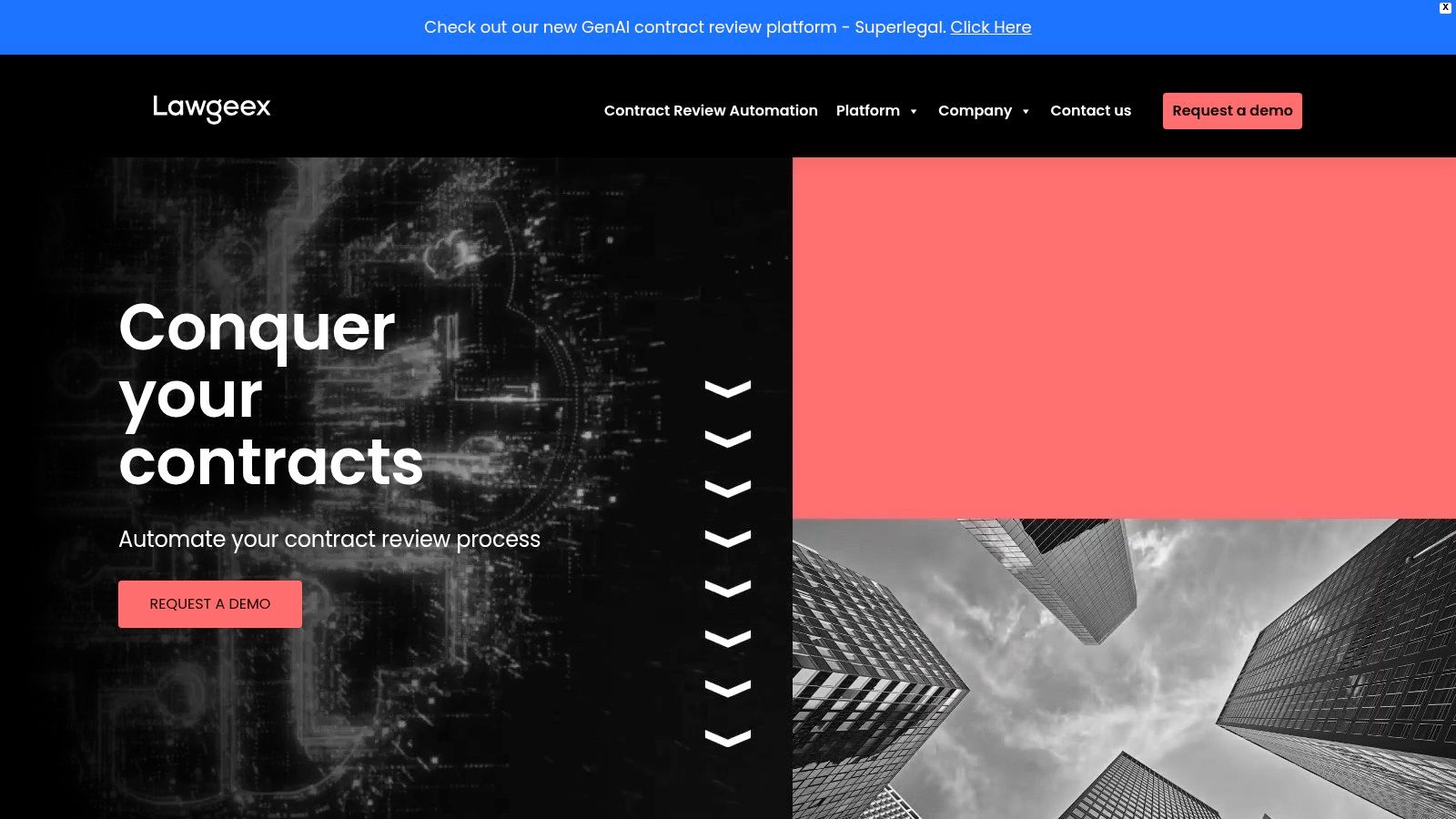
One of the key strengths of LawGeex is its ability to automate contract review workflows. Through pre-built playbooks tailored to common contract types, like NDAs, MSAs, and DPAs, the platform can quickly assess risk and ensure compliance with internal policies. This functionality is particularly valuable for legal professionals, healthcare providers, and security and compliance officers who need to ensure contracts adhere to specific regulatory requirements and organizational standards. Integration with existing CRM and contract management systems further streamlines the contract lifecycle, creating a seamless process from initial drafting to final signature. Real-time collaboration tools within the platform also facilitate communication and efficiency within legal teams, particularly when dealing with flagged contracts needing review.
LawGeex shines in its ability to significantly reduce contract review time, often by as much as 80% according to some case studies. Its high accuracy for routine contract types makes it a valuable tool for handling standardized agreements. The platform is designed for easy integration with existing business workflows, minimizing disruption to current processes. Finally, its scalable nature makes it suitable for organizations dealing with high-volume contract processing. Learn more about LawGeex to delve deeper into its applications for legal professionals.
However, like any legal artificial intelligence software, LawGeex has its limitations. While it excels at processing standard agreements, its effectiveness diminishes when confronted with complex or non-standard contracts. These often require the nuanced understanding and interpretation of a human legal expert. The initial setup and policy configuration can also be extensive, demanding a significant investment of time and resources. While LawGeex identifies potential risks, it may not capture all nuanced legal risks, especially those requiring subjective judgment or contextual understanding. Finally, the subscription-based pricing model, while offering predictable costs, can be expensive for smaller organizations or those with lower contract volumes.
Implementing LawGeex effectively requires careful planning and preparation. Begin by clearly defining your organization's specific needs and objectives for contract review automation. Thoroughly assess your current contract workflows to identify areas where LawGeex can provide the most significant impact. Invest the necessary time in configuring the platform and establishing clear internal policies for contract review and approval. Training staff on how to use the platform effectively is crucial to maximize its benefits. Ongoing monitoring and evaluation of the system's performance will ensure its continued alignment with your organization's evolving needs.
While specific pricing and technical requirements are not publicly available and need to be obtained directly from LawGeex, it is crucial to understand the investment involved. Compare LawGeex with other similar legal artificial intelligence software tools like Kira Systems, ContractPodAi, and Ironclad to determine the best fit for your organization’s size, budget, and specific requirements. Considering these factors ensures a strategic and informed decision regarding the implementation of AI-powered contract review within your organization. This careful evaluation will enable you to leverage the power of legal artificial intelligence software effectively and maximize your return on investment.
Legal AI Software Feature Comparison
| Platform | Core Features ✨ | User Experience ★ | Value Proposition 💰 | Target Audience 👥 | Unique Selling Points 🏆 |
|---|---|---|---|---|---|
| Whisperit 🏆 | AI dictation, transcription, real-time collaboration, Swiss-hosted secure data | ★★★★★ Fast, intuitive, privacy-focused | 💰 Custom pricing, high ROI (up to CHF 750,000 saved) | 👥 Legal, healthcare, compliance pros | 🏆 Swiss encryption, GDPR & SOC 2 compliance, 3x faster doc creation |
| Ross Intelligence | Natural language legal research, IBM Watson AI | ★★★★ Intuitive, natural query | 💰 High subscription costs | 👥 Legal researchers, lawyers | ✨ AI-driven contextual case analysis |
| Lex Machina | Litigation analytics, judge & attorney data, visual reports | ★★★ Complex but powerful analytics | 💰 Expensive, niche analytics | 👥 IP, commercial litigation attorneys | ✨ Extensive federal court data, outcome predictions |
| Kira Systems | AI contract clause extraction, ML document review | ★★★★ Accurate, integrates well | 💰 High setup & training costs | 👥 Contract lawyers, M&A teams | ✨ Large legal clause library, bulk processing |
| eBrevia | AI contract analytics, data extraction, templates | ★★★★ User-friendly, fast processing | 💰 Flexible pricing, including pay-per-use | 👥 Legal, compliance teams | ✨ Excel export, minimal training needed |
| Luminance | Unsupervised ML, anomaly detection, multi-language | ★★★★ Minimal training, strong AI | 💰 Premium pricing | 👥 Due diligence, contract teams | ✨ Identifies risks & anomalies, multi-language |
| Westlaw Edge | AI-powered search, predictive analytics, citation check | ★★★★ Comprehensive but complex | 💰 High subscription costs | 👥 Lawyers, legal researchers | ✨ Integrated ecosystem, litigation analytics |
| LawGeex | Automated contract review, policy compliance AI | ★★★★ Scalable, reduces review time | 💰 Subscription-based, costly for small volumes | 👥 Legal teams, contract managers | ✨ Instant contract approval for routine agreements |
Embracing the AI Revolution in Law
From streamlining legal research with tools like Ross Intelligence and Westlaw Edge to automating contract review with LawGeex and Kira Systems, the legal artificial intelligence software solutions explored in this article offer a glimpse into the future of the legal profession. We've seen how these tools can significantly enhance efficiency by automating tedious tasks, reducing costs associated with manual labor, and improving the accuracy and speed of legal work. Key takeaways include the power of predictive analytics with Lex Machina for litigation strategy, the due diligence advancements provided by eBrevia and Luminance, and the innovative transcription solutions offered by Whisperit.
Choosing the right legal AI software depends heavily on your specific needs. Consider factors such as the size of your firm, your practice area, and your budget when evaluating these tools. Proper implementation is also crucial for success. This includes adequate training for staff and seamless integration with existing systems. Furthermore, as legal AI software transforms document management, streamlining the collection process is crucial. Learn more about effective strategies for collect documents efficiently to maximize the benefits of these AI tools. This comprehensive guide from Superdocu provides invaluable insights on mastering document collection.
The legal landscape is evolving rapidly, and embracing legal artificial intelligence software is no longer a luxury, but a necessity for staying competitive. By leveraging the power of AI, legal professionals, healthcare providers, and security and compliance officers can focus on higher-value tasks, improve client service, and ultimately, achieve better outcomes. Ready to experience the transformative power of AI in legal transcription? Explore how Whisperit can revolutionize your workflow with its cutting-edge legal artificial intelligence software, ensuring accurate and efficient documentation for your practice.